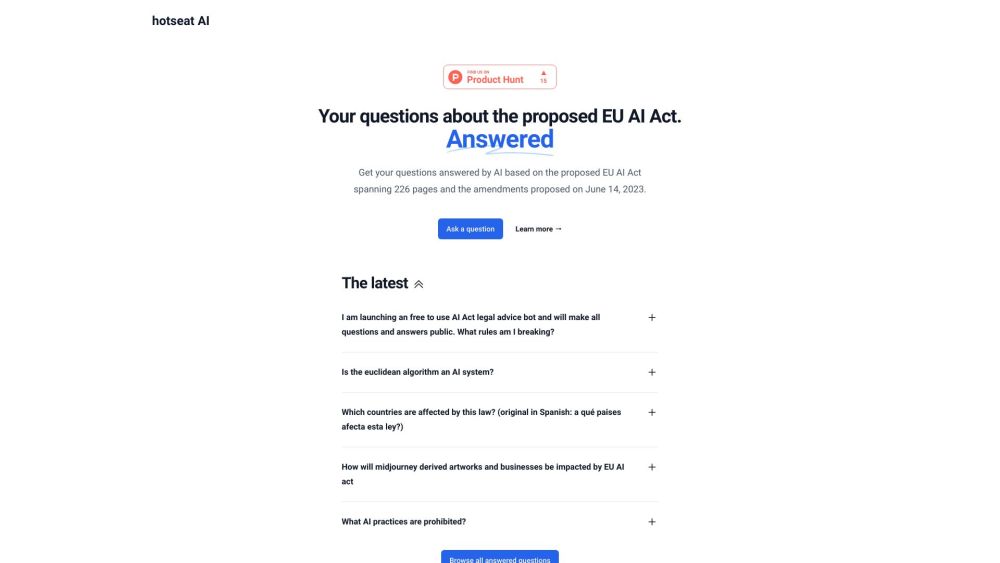AI Directory : AI Chatbot, Legal Assistant

What is Hotseat AI?
Hotseat is an AI-powered Q&A service for the 226-page-long EU's AI Act. It provides verifiable answers with word-to-word source quotes.
How to use Hotseat AI?
Simply visit hotseatai.com and post your question about the EU AI Act. The answers are generated by AI based on the entire text of the proposed EU AI Act and the amendments proposed on June 14, 2023.
Hotseat AI Support Email & Customer service contact & Refund contact etc.
Here is the Hotseat AI support email for customer service: [email protected] . More Contact, visit the contact us page(mailto:[email protected])
Hotseat AI Company
Hotseat AI Company name: Hotseat AI .
Hotseat AI Login
Hotseat AI Login Link: https://hotseatai.com/sign-in
Hotseat AI Pricing
Hotseat AI Pricing Link: https://hotseatai.com/pricing
FAQ from Hotseat AI
What is Hotseat AI?
Hotseat is an AI-powered Q&A service for the 226-page-long EU's AI Act. It provides verifiable answers with word-to-word source quotes.
How to use Hotseat AI?
Simply visit hotseatai.com and post your question about the EU AI Act. The answers are generated by AI based on the entire text of the proposed EU AI Act and the amendments proposed on June 14, 2023.
To what extent will Member States be allowed / empowered to deviate from the Act, and in which respects? What level of uniformity can we expect?
The EU AI Act is mainly designed to establish uniformity in the regulation, use, and marketing of AI systems across all Member States. However, it does allow for some flexibility, particularly in areas relating to worker protection and labor rights regarding AI systems use by employers, enabling Member States to implement their laws that favor workers. Certain annexes of the Act also indicate that while some directives and regulations enforce uniformity, there's still space for minor variation across Member States depending on national laws and interpretations in specific contexts.
What rights or processes does the AI Act introduce aimed at end users of AI models (through AI-powered applications)? What kinds of problems do these regulations or processes aim to address?
The AI Act introduces important regulations with the intent of safeguarding end users of AI systems. It is aimed at ensuring transparency and accountability for AI systems. Providers of AI are required to disclose when users are interacting with an AI system, details about its functionality, decision-making process, and also about users' rights to object against it or seek legal redress. Furthermore, legislation is in place to tackle the issue of 'deep fakes': manipulative content created by AI systems. Users are given the right to lodge complaints to national authorities if they believe an AI system violates the Act's regulations. The Act emphasizes accessible reporting and redress mechanisms, and users have the right to lodge complaints against providers or deployers of AI systems that they feel have infringed on regulations.
Who will bear responsibility for AI-made decisions according to the AI Act?
Responsibility for decisions made by AI under the AI Act will likely fall on several parties. The providers or creators of high-risk AI systems are responsible for ensuring their compliance with the Act's requirements and correctness of these systems, and must also monitor their performance even post-deployment. If you're deploying a high-risk AI system, you're responsible for using it according to the provided instructions. Context and a party's adherence to their specified obligations are crucial, as there's a broad range of existing European and international laws that can apply to AI systems which can also assign responsibility in cases of harm or damage.
What are the penalties for non-compliance with the EU AI Act?
Non-compliance with the EU AI Act can have significant financial consequences, depending on the severity of the violation. Penalties established by EU Member States could potentially range from fines up to €40,000,000 or up to 7% of a company's total worldwide annual turnover for the previous year for the most serious infringements. Lesser infractions may incur fines up to €10,000,000 or 2% of a company's worldwide annual turnover. It's important to note that these potential penalties can't be mitigated or shared through contracts or other agreements; each entity involved in the AI system's creation, distribution, or deployment must bear its own responsibility for complying with the Act's regulations.
